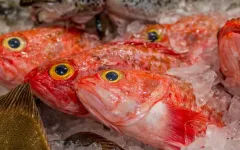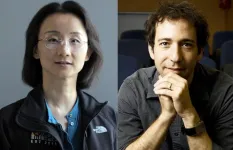(Press-News.org) University of Queensland researchers are calling for reforms to Australia’s environmental laws, as threatened fish species continue to be legally exported.
Their work has identified four species that have been listed under Australia’s Environment Protection and Biodiversity Conservation (EPBC) Act and legally exported from Australia: the orange roughy, blue warehou, school shark and southern bluefin tuna.
Despite being listed as threatened under Australia’s under-review EPBC Act, UQ PhD candidate Rosa Mar Dominguez-Martinez said these fish continue to be exported.
“Since the inception of the Act, 107 kilotons, or 10 per cent of all Australian seafood exports, have been of these four listed threatened species,” Ms Dominguez-Martinez said.
“You might think that there are plenty more fish in the sea, but these species are in real danger.
“In fact, Australia's Threatened Species Scientific Committee – the expert group responsible for providing listing advice and recovery strategies – found that all of these species were eligible for listing in higher threat categories: Critically Endangered for the blue warehou and southern bluefin tuna, or Endangered for the school shark and orange roughy.
The researchers reveal that this occurs due to a loophole within the legislation.
“Currently, the EPBC Act includes a category unique to Australia called 'Conservation Dependent', which only applies to marine fish species, as terrestrial species cannot be listed under this category,” Ms Dominguez-Martinez said.
“There are eight species listed as ‘Conservation Dependent’ and all are caught in commercial fisheries. All of these species are required to have a legally enforced management plan aimed at stopping their decline – however, with the exception of the southern bluefin tuna, their conservation status has not improved, and they remain overfished, or are unassessed in Australia.
“This classification effectively exempts these species from the stricter regulations that would apply if they were listed under standard threat categories, such as Vulnerable, Endangered, or Critically Endangered.
“While other native species listed as threatened under the EPBC Act require a special permit for export, Conservation Dependent species are exempt from this requirement.
“So – while the EPBC Act currently undergoes federal review – we’re calling for Australia’s new legislation to treat commercially harvested threatened species the same as other threatened species.”
Senior author Associate Professor Carissa Klein said the team also recommend two other significant changes, which would better protect Australia’s threatened marine species.
“Australia’s new environmental protection legislation must also mandate regular review of the conservation status of all threatened species,” Dr Klein said.
“If more regular reviews were done, species like the southern bluefin tuna – which is not currently assessed as overfished – would be de-listed from EPBC Act more swiftly.
“And species acknowledged as threatened under international listings, such as the IUCN Red List or through global conventions, should be assessed in Australia’s new threatened species legislation.
“These recommendations are essential to prevent further extinctions in Australian waters.”
The research is published in npj Ocean Sustainability.
END
Environmental law reform needed to protect endangered marine species
2024-10-09
ELSE PRESS RELEASES FROM THIS DATE:
UC Irvine-led team engineers new enzyme to produce synthetic genetic material
2024-10-08
Irvine, Calif., Oct. 8, 2024 — A research team led by the University of California, Irvine has engineered an efficient new enzyme that can produce a synthetic genetic material called threose nucleic acid. The ability to synthesize artificial chains of TNA, which is inherently more stable than DNA, advances the discovery of potentially more powerful, precise therapeutic options to treat cancer and autoimmune, metabolic and infectious diseases.
A paper recently published in Nature Catalysis describes how the team created an enzyme called 10-92 that achieves ...
New study unveils unique combination of DNA techniques to authenticate ginseng supplements and combat adulteration
2024-10-08
Rosalee Hellberg, an associate professor in Chapman University’s Food Science Program, and her research team have made a significant breakthrough in the fight against adulteration in dietary supplements. Effective methods for identifying adulteration and fraud have remained elusive. Now, a new study of 50 commercially available ginseng products has found surprising results.
Ginseng products are vulnerable to fraud, with cheaper plant materials substituted for genuine ingredients, posing risks to consumer health and safety. Using a novel combination of DNA testing techniques, the researchers detected undeclared plant species in nearly half of the 50 ginseng supplements tested.
The ...
Argonne receives funding for artificial intelligence in scientific research
2024-10-08
The U.S. Department of Energy (DOE) has awarded DOE’s Argonne National Laboratory funding as part of its Artificial Intelligence (AI) for Scientific Research program. These grants will drive the development of cutting-edge AI technologies that promise to accelerate scientific discovery while preserving data privacy and improving energy efficiency.
Argonne Computational Mathematician Kibaek Kim received funding for the project called Privacy-Preserving Federated Learning for Science: Building Sustainable and Trustworthy Foundation Models. This project ...
Significant worldwide disparities in availability and timeliness of new cancer drugs
2024-10-08
Despite considerable progress in the discovery and development of new cancer drugs, there are significant disparities in both the availability and timeliness of these medicines worldwide, with poorer countries missing out, suggests a global analysis of new drug launches between 1990 and 2022, published in the open access journal BMJ Global Health.
Few new cancer drugs were launched in lower-middle or low income countries, and the gap between rich and poor nations widened over the three decades, the analysis shows.
Such inequities may help explain poor cancer outcomes in many countries, particularly those ...
4+ hour emergency care wait linked to heightened risks of death and longer hospital stay for hip fracture patients
2024-10-08
Waiting more than 4 hours in emergency care for treatment is linked to heightened risks of death and a longer hospital stay for hip fracture patients, reveals a single centre study, published online in Emergency Medicine Journal.
The waiting time for more than 1 in 3 of these patients exceeded the 4 hour national standard, which now requires that 76% of emergency department patients must either be discharged or admitted to hospital within that time frame.
By the age of 80 an estimated third of women and 17% of men will have ...
Policy change may be helping to drive rise in treatment-resistant vaginal thrush
2024-10-08
A change in policy may be helping to drive a rise in treatment-resistant vaginal thrush, amid significant yearly increases in the prevalence of fungal infections caused by fungal Candida species, suggests the first study of its kind, published online in the journal Sexually Transmitted Infections.
While the exact reasons for these trends aren’t yet clear, they follow a shift in clinical practice, with the aim of reducing laboratory workload, say the researchers. Family doctors in primary care are now encouraged to treat vaginal thrush empirically—on signs and symptoms alone, rather than on confirmatory lab test results.
Vaginal thrush is ...
Heat stress may still affect babies once born, first evidence suggests
2024-10-08
EMBARGOED UNTIL 23:30 UK TIME TUESDAY 8 OCTOBER 2024
Peer-reviewed / Data analysis / People
Heat stress may still affect babies once born, first evidence suggests
Exposure to high levels of heat may both impact the growth of foetuses during pregnancy and infants up to the age of two, a new analysis suggests.
The study is the first of its kind to show that heat stress may impact the development of babies after they’re born and adds to previous research by the team showing the impact of heat stress on foetal development.
The research, which examined data from infants and their mothers collected during a clinical trial in ...
Stressed bees lack the buzz in life
2024-10-08
Stressed bees are much more likely to make pessimistic choices and lack a buzz in life, new research has revealed.
Scientists at Newcastle University, UK, have found that bumblebees have a response to an adverse event resembling human emotions.
Findings, published today in Proceedings of the Royal Society B, show bees reduce their expectations of reward when they are agitated, and this could impact how they approach and pollinate flowers.
High and low rewards
Researchers trained bees to decide about whether a colour signalled something good or bad.
Bees learned to identify ...
UC Irvine researchers discover atomic-level mechanism in polycrystalline materials
2024-10-08
Irvine, Calif., Oct. 8, 2024 — Researchers at the University of California, Irvine and other international institutions have for the first time achieved atomic-scale observations of grain rotation in polycrystalline materials. Widely used in electronic devices, aerospace technologies, automotive applications and solar energy systems, these substances have long been studied for their unique properties and structural dynamics.
Using state-of-the-art microscopy tools housed in the UC Irvine Materials Research Institute, scientists were able to heat samples of platinum nanocrystalline thin films and observe the mechanism driving grain rotation in unprecedented ...
USC’s Rong Lu and Caltech’s Michael B. Elowitz win the NIH Director’s Transformative Research Award for their new approach to study blood and immune cell production in bone marrow
2024-10-08
Is it possible to study the production of blood and immune cells inside the bone marrow? For the first time ever, the answer is yes, thanks to a new approach pioneered by USC Stem Cell scientist Rong Lu and Caltech synthetic biologist Michael B. Elowitz, together with co-investigators Carlos Lois and Lior Pachter at Caltech.
The new approach will enable the scientists to study the blood-producing stem and progenitor cells, also called hematopoietic stem and progenitor cells (HSPCs), within the difficult-to-access ...


